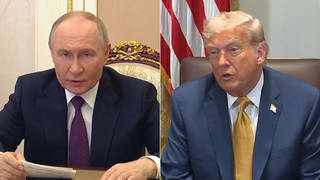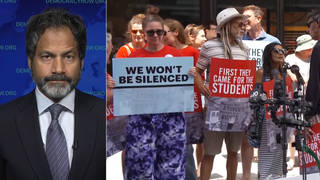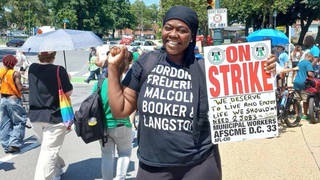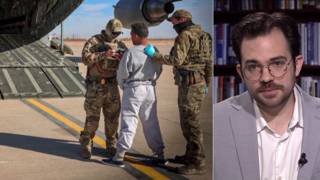
Topics
Guests
- Alexandra PoolosReporter for PBS FRONTLINE/World.
- Sabin WillettLawyer representing the Uyghurs detained in Guantanamo.
Links
Uyghur prisoners at Guantanamo have long been determined to be not guilty of terrorism. But seventeen of these ethnic Muslim Chinese are still imprisoned at Guantanamo after almost eight years. Five were forcibly resettled in Albania, isolated and away from their families. We speak with their lawyer, Sabin Willett, and PBS FRONTLINE reporter Alexandra Poolos, who has followed their story for a new report. [includes rush transcript]
Transcript
AMY GOODMAN: Last week, President Obama signed an executive order requiring the closure of Guantanamo Bay prison within a year.
PRESIDENT BARACK OBAMA: This first executive order that we are signing, by the authority vested in me as president of the — president, by the Constitution and the laws of the United States of America, in order to effect the appropriate disposition of individuals currently detained by the Department of Defense at Guantanamo and promptly to close the detention facility at Guantanamo, consistent with the national security and foreign policy interests of the United States and the interests of justice, I hereby order. And we then provide the process whereby Guantanamo will be closed no later than one year from now.
AMY GOODMAN: The President also authorized a taskforce to review the cases of the 240-odd prisoners currently in Guantanamo and decide where they should be sent. The Pentagon says a hundred of the prisoners are considered “too dangerous to be released” but cannot be tried for lack of evidence. Some eighty others could face criminal charges in US courts. And the remaining sixty have already been cleared for release, but cannot be sent home because their own countries would likely harm them.
As US lawmakers and European Union countries debate the fate of the prisoners at Guantanamo and where they can be resettled, we turn to a group of prisoners that not only have been cleared for release but also have been reclassified as civilians. These seventeen prisoners are no longer considered enemy combatants but are entering their seventh year of captivity at Guantanamo. They are the Uyghurs, a Muslim ethnic minority group from western China.
I’m joined now by two guests. Alexandra Poolos is a reporter for PBS FRONTLINE/World. She joins us here in the firehouse studio in New York. Her latest report about the Uyghurs, how twenty-two of them ended up in Guantanamo, how five were released in mid-2006 to Albania, and how the remaining seventeen continue to languish in detention because no country wants to resettle them. The report is called “Getting Out of Gitmo” and can be seen in full at pbs.org/frontlineworld.
Sabin Willett is an attorney for the Uyghurs. He joins us now from Boston. Last week, he sent a letter to Secretary of Defense Robert Gates and Attorney General-designate Eric Holder, urging them to immediately release the Uyghurs and resettle them in the United States.
We want to welcome you both to Democracy Now! First of all, Alexandra, how did you learn about this story?
ALEXANDRA POOLOS: It was a really funny coincidence. I was at my college reunion about two years ago, May. And I was sitting next to, you know, a friend of mine who was a corporate attorney. And I was sort of teasing him about being a corporate attorney. And he said, “Hey, look, I’m representing Guantanamo detainees.” And he started to tell me this story about the Uyghurs. And he said, “In fact, just this month, a bunch of them were sent to Albania.” And being part Albanian myself ethnically, I was sort of like, “Why would anyone send anyone to Albania? How did this happen?” So that’s how I found out about it.
AMY GOODMAN: And who are the Uyghurs?
ALEXANDRA POOLOS: The Uyghurs of Guantanamo are a Muslim ethnic minority group from China that basically had a circuitous journey that ended up in Afghanistan. Some of them were there to do some sort of ad hoc military training. There was a Uyghur training camp in Afghanistan. I want to emphasize that there was, you know, one AK-47 there. I mean, this was not like a high-level place. Others were economic migrants who ended up in Afghanistan as sort of a way station as they tried to go to overland routes to Turkey. And they got caught up post-9/11. We were bombing Afghanistan. They were fleeing out of their training camp. They crossed the border into Pakistan. And they got turned over by villagers to US forces and sent to Guantanamo.
AMY GOODMAN: I want to start right now with an excerpt of the FRONTLINE/World report, “Getting Out of Gitmo.” This is the story of how the Uyghurs ended up at Guantanamo, following one of the Uyghurs formerly detained at Guantanamo, now in Albania, Abu Bakker Qassim.
ALEXANDRA POOLOS: Abu Bakker’s big move came in mid-2000. He says he headed out of Xinjiang looking for work. Leaving was bittersweet. His wife was now pregnant. He told her he would be back in six months. But the trip didn’t go as planned.
From his home in Xinjiang, Abu Bakker headed southwest. Running low on money, he stopped in a Uyghur village in Afghanistan. It was a decision that left him in one of the worst spots in the world after the 9/11 attacks. The US had just begun bombing the al-Qaeda stronghold in Tora Bora where Abu Bakker had been staying. In the confusion that followed, US forces pursued hundreds of al-Qaeda suspects who fled the bombings. Cash bounties offered by US forces encouraged local villagers to turn in as many people as they could capture. And this is what Abu Bakker and two dozen other Uyghurs say happened to them.
JOHN KIRIAKOU: If a Pakistani or Afghan villager comes up to you with a guy he has tied up and says, “This is a terrorist. I caught him in my village,” what are you going to do? Maybe he is a terrorist.
ALEXANDRA POOLOS: John Kiriakou was a top CIA official in Pakistan after 9/11. He says the only way to sort out the captives was to send them to Guantanamo.
JOHN KIRIAKOU: We viewed it as a place where you had the luxury of time, you had a staff of linguists, and you could spend quality time with each one of these prisoners, interviewing them and getting to the bottom of each one of these stories.
AMY GOODMAN: “Getting Out of Gitmo,” excerpt. This is Democracy Now!, democracynow.org, the War and Peace Report. We will come back with the reporter and the lawyer for the Uyghurs. Stay with us.
[break]
AMY GOODMAN: We return to another excerpt of the PBS FRONTLINE/World report called “Getting Out of Gitmo.” This traces how the innocence of the Uyghurs became clear less than a year after their capture. The State Department began working on trying to resettle the Uyghurs as early as 2002.
PIERRE-RICHARD PROSPER: It became clear to us who these Uyghurs were, in fact, that they were not part of the al-Qaeda network. We decided that there were many of them that could actually be released or transferred from Guantanamo.
ALEXANDRA POOLOS: At the State Department, Pierre-Richard Prosper would be put in charge of the Uyghur cases. For him, the Uyghurs presented a unique dilemma. The US did not regard the Uyghurs as a threat, but the Chinese saw them as terrorists.
PIERRE-RICHARD PROSPER: We looked into sending them back to China. And the more we examined it, the more complicated the question became. We spent years trying to find a home for them. When I left at the end of 2005, the Uyghurs were still there.
ABU BAKKER QASSIM: [translated] Sometimes the interrogators came only once a month, or even once every two months. We would end our lives there, I thought.
ALEXANDRA POOLOS: At this point, the Uyghurs were entering their fourth year at Guantanamo, stuck in a seemingly endless waiting game.
RUSHAN ABBAS: The interrogators lost interest in them, because their story is not what they are looking for. They kept being told they are innocent, they are innocent, they are going to be released soon.
AMY GOODMAN: Rushan Abbas, the last woman you heard, is the Uyghurs’ translator at Guantanamo. As we turn to the last part of the PBS FRONTLINE/World report “Getting Out of Gitmo” about, well, why Albania took five of the Uyghurs in 2006 and the reaction of the Chinese government.
ALEXANDRA POOLOS: After years of controversial foreign policy, the Bush administration had few friends left in the world. They turned to Albania, one of the last countries where the United States still had leverage. Albania agreed to take five of the twenty-two Guantanamo Uyghurs. The following year, President Bush became the first sitting US president to visit the country.
LULZIM BASHA: We have tried to do our best to help out with one of the aspects of the war against terror, which is the difficult situation in Guantanamo.
ALEXANDRA POOLOS: We asked the Albanian foreign minister Lulzim Basha if they took the Uyghurs as part of a quid pro quo for aid.
LULZIM BASHA: I wouldn’t say this was a tradeoff. Just like our presence in Iraq, our presence in Afghanistan, this is a sign of our will and our capacity to share the responsibility in the coalition against terror.
ALEXANDRA POOLOS: But the Chinese weren’t happy and began to pressure the Albanians to hand back the Uyghurs.
LIU JIANCHAO: [translated] The five people accepted by Albania are not refugees, but terrorist suspects. We think they should be sent back to China as soon as possible.
ALEXANDRA POOLOS: Not long after, the Albanian prime minister met with a Chinese delegation. He would not hand back Abu Bakker and the others, but he also wouldn’t do anything more to provoke the Chinese. Despite requests, the Albanians would not take any of the seventeen Uyghurs remaining at Guantanamo, and neither would anyone else.
UNIDENTIFIED: We actually have not sent Uyghur detainees from Guantanamo to any country other than Albania. Many other countries, almost every other country in the world has been approached with respect to taking Uyghur detainees, but no one has actually agreed to take them.
ABU BAKKER QASSIM: [translated] Five of us have been cleared and released, but the rest of us are still there. Now, seventeen Uyghurs have been detained in Guantanamo for seven years. I don’t know how it came to this.
AMY GOODMAN: Abu Bakker Qassim, that last voice. This piece, “Getting Out of Gitmo,” Alexandra Poolos is the reporter for PBS’s FRONTLINE/World. Why was Albania working so closely with the United States, Alexandra?
ALEXANDRA POOLOS: Well, nobody would say this on the record, but several days after they agreed to take the Uyghurs, you had people like Vice President Dick Cheney coming out and saying, “I support Albania’s bid for NATO,” which, considering the state the country is in, both, you know, their military and where they’re at with reconstructing after communism, it’s kind of a stretch.
AMY GOODMAN: Sabin Willett is with us, as well. He’s the lawyer representing the Uyghurs detained at Guantanamo. Sabin, tell us your clients’ story and how you came to be involved with them, both the ones who were forcibly resettled in Albania and the ones who remain at Guantanamo today.
SABIN WILLETT: Good morning, Amy.
Abu Bakker, who I think you just saw, was one of the first two clients we took on early in 2005. And he and three other — he and four other men were sent to Albania on the eve of a hearing that was going to expose to the court of appeals the fact that these men had been cleared a long time ago. The reason that those five were sent, and not the other seventeen, is that their hearing had come up first. The other seventeen’s had been stayed by the Bush administration. And there, they remain in Gitmo this morning because of the sort of reaction that you saw from China, not only with regard to the Albanians, but with regard to every other country.
Now, the question that no one has answered is, well, alright, why are they sitting in a military prison while we wait for some other country to take them? Why aren’t they here? In fact, when, finally, in the summer of 2008 the Supreme Court restored habeas jurisdiction, we took their case to the habeas judge, and in October Judge Urbina ordered the seventeen released. He ordered them brought here. He specifically asked the government for any evidence that they might impose some sort of danger to someone. And there was none. That order was stayed by the Bush administration when it sought an appeal, and the appeal is still pending.
But to circle back to where you began this story, President Obama’s order said that they would be reviewing the cases of the prisoners at Guantanamo and then deciding what to do with them. And we sent off the letter you mentioned to point out that everyone on earth has reviewed this case. It doesn’t need to be reviewed again. No one thinks that they are criminals or enemies. And so, they need to be released, and they need to be released now.
The other point we’ve been trying to make to the administration is that Europe is — and the rest of the world is not going to help us by resettling other cleared people until the United States finally participates, which it never did under the Bush administration. That means we have to take someone. And these people are perfectly situated to be taken. So, for all those reasons, we’re hoping that there will be some action behind the welcome words we heard from the new administration last Thursday.
AMY GOODMAN: So let’s be clear. Even the men who are in Albania, are they free to move about entirely? And have they ever seen their families?
SABIN WILLETT: They are free to move about within Albania. They don’t have visas to go abroad. And Albania is a desperately poor country. The language is a challenge. The culture is different from anything in their past, although there is a meaningful Muslim minority there, which is significant. So it’s difficult economically for these fellows to forge a path ahead, but they’re not in any kind of a prison or detention facility, and they’ve not, as far as I know, been able to see any of their families, because the families haven’t been released from China or permitted to travel to Albania.
AMY GOODMAN: Alexandra Poolos, in your piece, “Getting Out of Gitmo,” it’s a very touching moment in Albania when Abu Bakker Qassim calls his wife. Two of the men there have released their wives to marry other men, because they can’t see them?
ALEXANDRA POOLOS: Yeah, they’ve said, “You can divorce us.” I mean, I think they’re accepting the reality that they’re not going to see their wives or their families, possibly ever again. I mean, China is not giving these women and the kids travel visas. They want the Uyghurs back in China. They want to prosecute them. They probably want to send them, at the very least, to a labor camp. Who knows what else?
Abu Bakker told us he doesn’t want to divorce his wife, but, I mean, he told me very clearly, “We’re like friends now. We’re like acquaintances. I mean, what do you say to somebody you haven’t seen for eight years?” His wife was pregnant with twins when he left China. He’s never seen his children.
AMY GOODMAN: Their first two children.
ALEXANDRA POOLOS: Yeah. He’s never seen them. So he — I listened to him have this conversation with his children and then his wife, and it was a very poignant moment, because the whole time I was with him, he was very closed, very obviously traumatized — probably one of the hardest interviews I’ve done in my career — and when you saw him on the phone, you saw that guard come down, you saw him connecting with somebody. And you realized this is somebody who’s living in his home. He doesn’t want to go outside of his home, because there’s children playing on the street. And he told me it’s just too painful for him to see kids. And he’s accepting, “This is my life. I’m going to be in Albania for the rest of my life. And with some luck, a lot of luck, I could be a cab driver here.”
AMY GOODMAN: One of these five Uyghurs is now in Stockholm, Sweden?
ALEXANDRA POOLOS: Yes, that’s right. One — there were some circumstances where I believe he had a sister there, and he went to visit her there, and while he was there he applied for political asylum. And as I understand it — and, Sabin, correct me if I’m wrong — the trick was, is he was applying from Albania, and he could not say he was being persecuted in Albania, because he wasn’t. So they told him, “No, you can’t have asylum.” But I think now they are appealing the case.
AMY GOODMAN: Sabin Willett, these seventeen men who remain at Guantanamo, the question of them coming into this country, are you speaking with Obama officials right now? Why cannot they come? The US government has said they are not terrorists. They are not guilty of anything.
SABIN WILLETT: Well, that is exactly what we’re trying to do. We have approached, both formally and informally, the administration to say it is in our clients’ interest and it is in your interest, if you really are serious about cleaning out Guantanamo in a year, to start by bringing these men here, which will permit you to look Europe in the eye and look Canada in the eye and look the rest of the world in the eye and say, “Now it’s time for you to help with some of the other cleared folks.”
But you’ve seen in the last week, actually, a sort of hysteria erupt over this very thing that you mentioned, of the men who are — you know, we can’t try them, but they’re too dangerous to release. And I say, who are those people? They never give you a name. They never explain why it is you can’t prosecute somebody, but “we know that he’s too dangerous to release.” It’s just paranoia. And it’s that kind of paranoia which has unfortunately gotten in the way of finally granting some justice to these men.
AMY GOODMAN: The description of the men at Guantanamo and what they have gone through, one of them wanting to drop the case, because, what, they removed a sheet from his room?
SABIN WILLETT: Yeah, he told me the American justice system wasn’t worth his bed sheet. And he told me that in 2006, and I’d have to say, since it’s 2009 and he’s still there, I think he’s right. Don’t you?
AMY GOODMAN: He felt he was being punished for bringing the case —-
SABIN WILLETT: Right.
AMY GOODMAN: —- and they took his bed sheets. Some of these men, in solitary confinement for how many years?
SABIN WILLETT: Well, no one is in solitary anymore, but one of the remarkable things here is that the conditions of the Uyghurs’ imprisonment, as it became more and more obvious that they were innocent, the conditions got worse. And in 2006, they were sent into a dreadful place called Camp 6, which is essentially solitary confinement in a dungeon. And we watched these men begin to crack up in front of our eyes all through 2007, all into 2008. And it wasn’t until we won the court case that they got moved into the camp where they are now, which is more like a traditional POW camp. And we’ve seen a great improvement in their state of mind.
But, frankly, one of our men who was in Camp 6, to follow up on the situation with wives, he sent a message out, too, that his wife should feel free to remarry. He thought he would never leave Guantanamo, and he didn’t want his prison to be hers. In fact, his name is Hozaifa Parhat. He’s the guy who won his famous case last summer. But hasn’t made any difference to his life. He’s in Guantanamo this morning.
AMY GOODMAN: Alexandra Poolos, just the background of the repression of the Uyghurs in western China, this ethnic Muslim minority?
ALEXANDRA POOLOS: Yeah, I mean, these are people who cannot speak freely to the press. They’re under constant surveillance by the government. If you speak to any reporter who attempts to go to western China, it’s a very, very tricky, difficult thing to do.
My co-producer and reporter Serene Fang actually went to western China several years ago to meet with an activist there, and they had a clandestine meeting, and she walked out of the meeting and was promptly arrested and taken off to an interrogation hotel. And he was imprisoned. He’s still there today.
So these are people — China has a policy of trying to populate that area with what they consider ethnic Chinese or Han Chinese. They want to stamp down this minority group. And this group just basically wants their rights. They want their right to practice their religion, to have their own cultural values. They’re really not a threat, but China sees them as a terrorist. And they’ve, in some cases, managed to, in the post-9/11 environment, encourage the US to see these guys this way, even though we have had a longstanding relationship understanding who the Uyghurs are and supporting their cause.
AMY GOODMAN: I want to thank you both for being with us. Alexandra Poolos, reporter for PBS’s FRONTLINE/World. The piece is called “Getting Out of Gitmo.” And you can go to FRONTLINE/World’s website, and you can watch it. Sabin Willett, thank you very much for being with us, lawyer representing the Uyghurs, both the ones who are in Albania and the seventeen who remain in Guantanamo for almost eight years.













Media Options